完形填空-- 中华文化 专题练 2025年中考英语一轮复习备考
文档属性
| 名称 | 完形填空-- 中华文化 专题练 2025年中考英语一轮复习备考 |
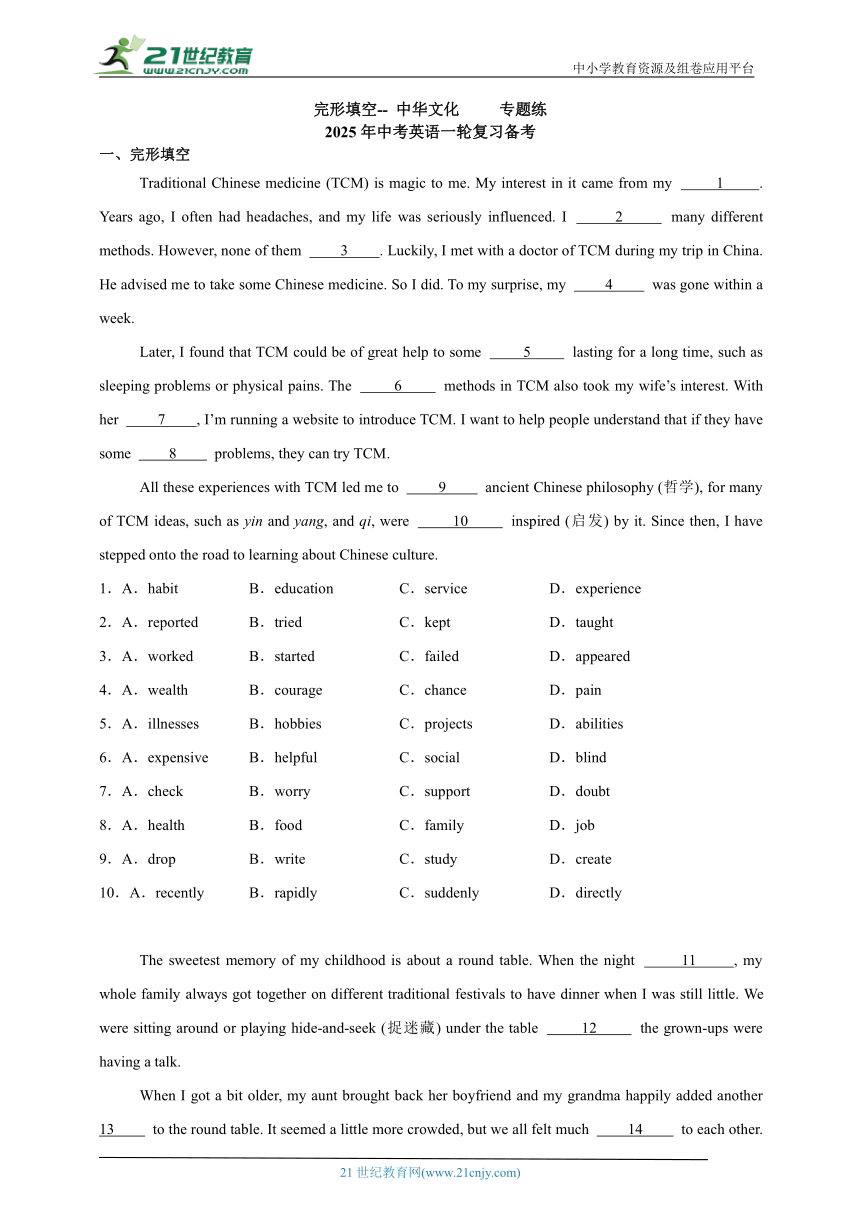
|
|
| 格式 | docx | ||
| 文件大小 | 56.4KB | ||
| 资源类型 | 试卷 | ||
| 版本资源 | 通用版 | ||
| 科目 | 英语 | ||
| 更新时间 | 2025-03-10 00:00:00 | ||
图片预览

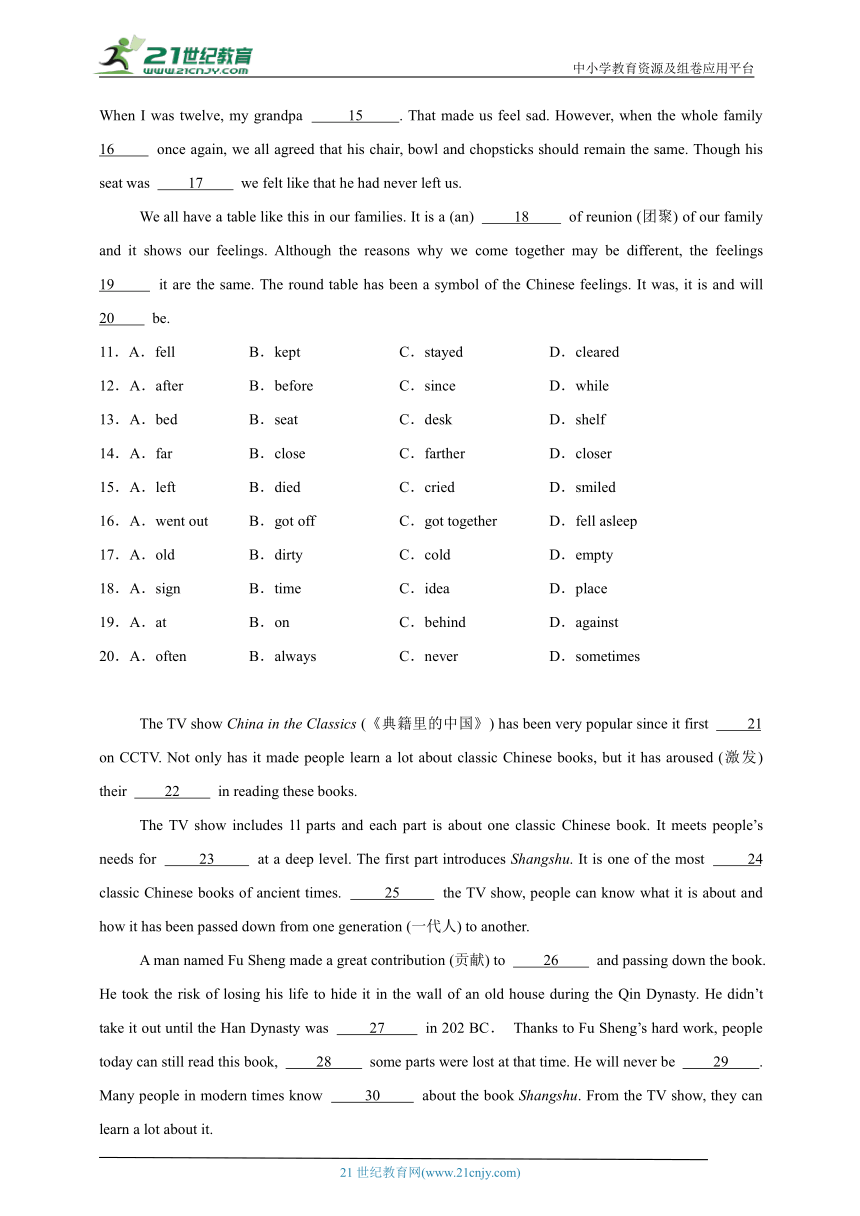
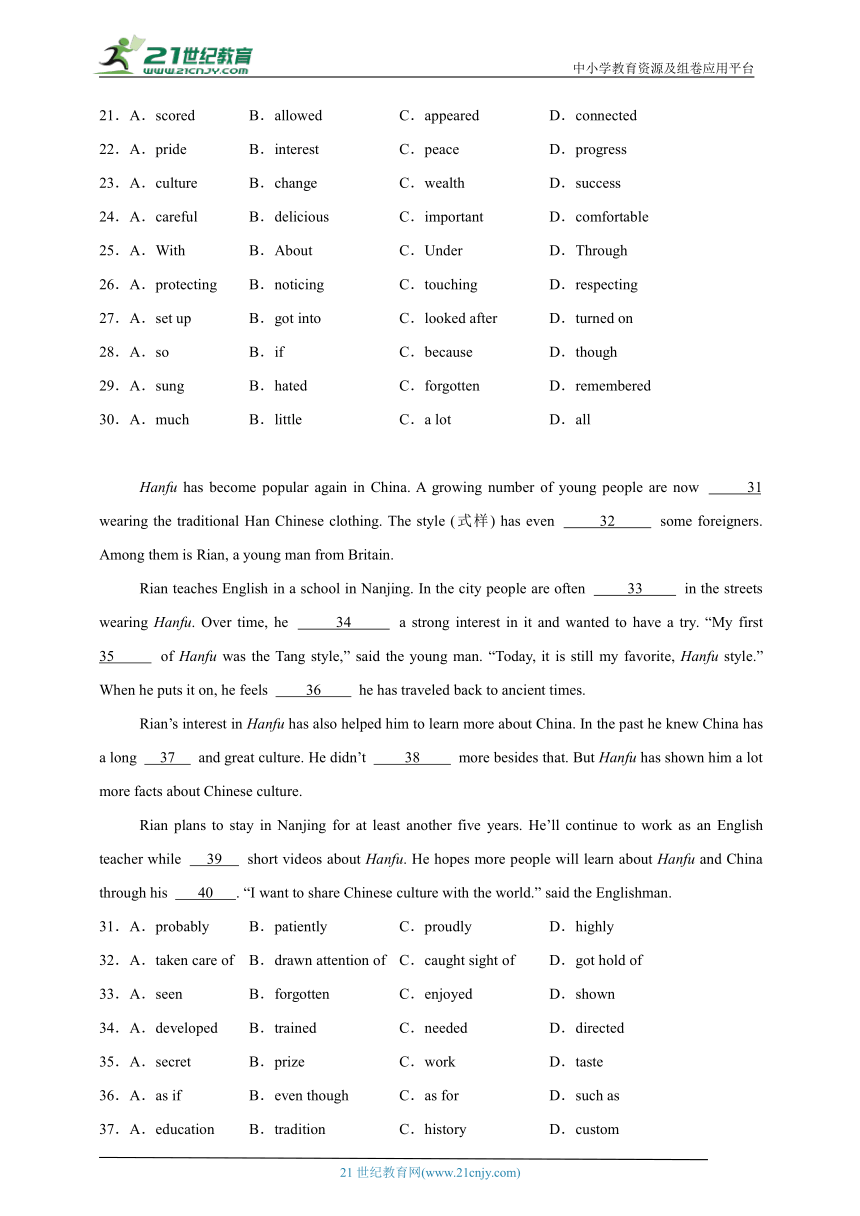
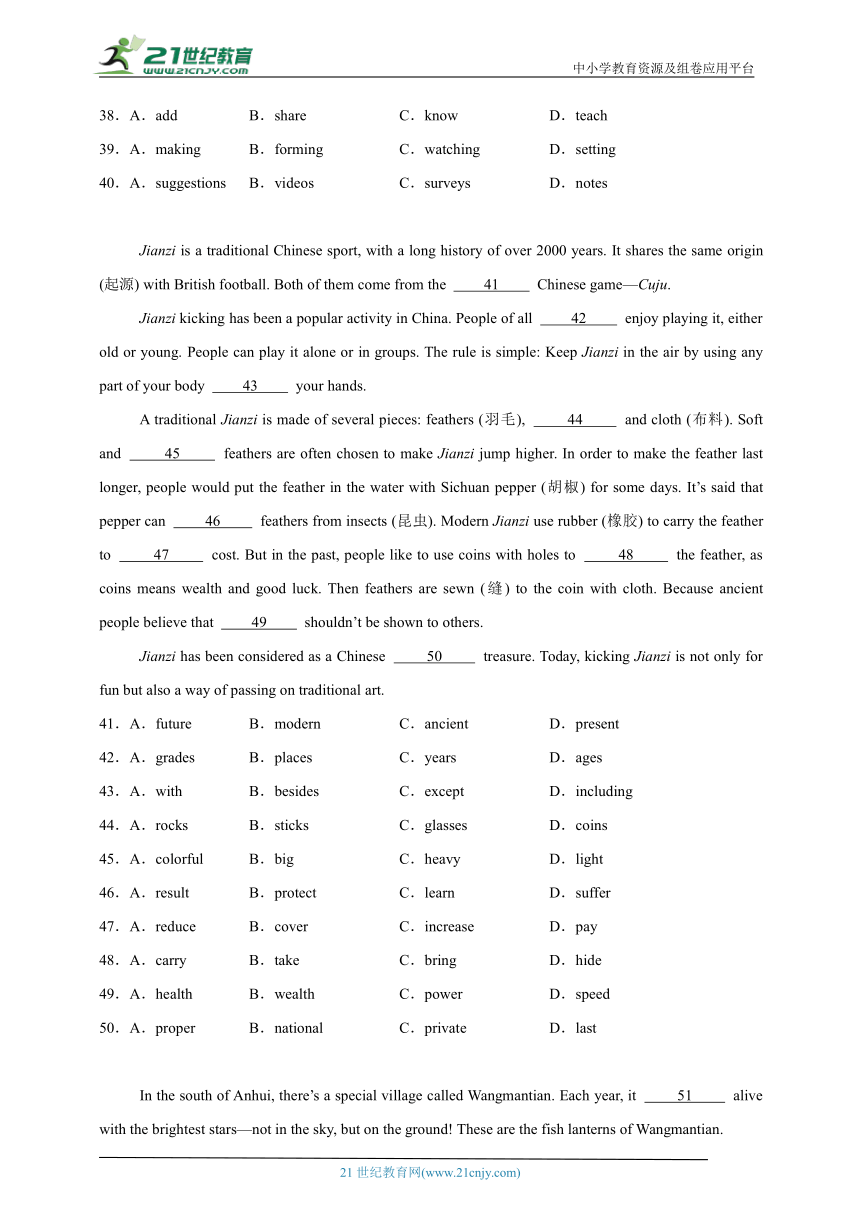
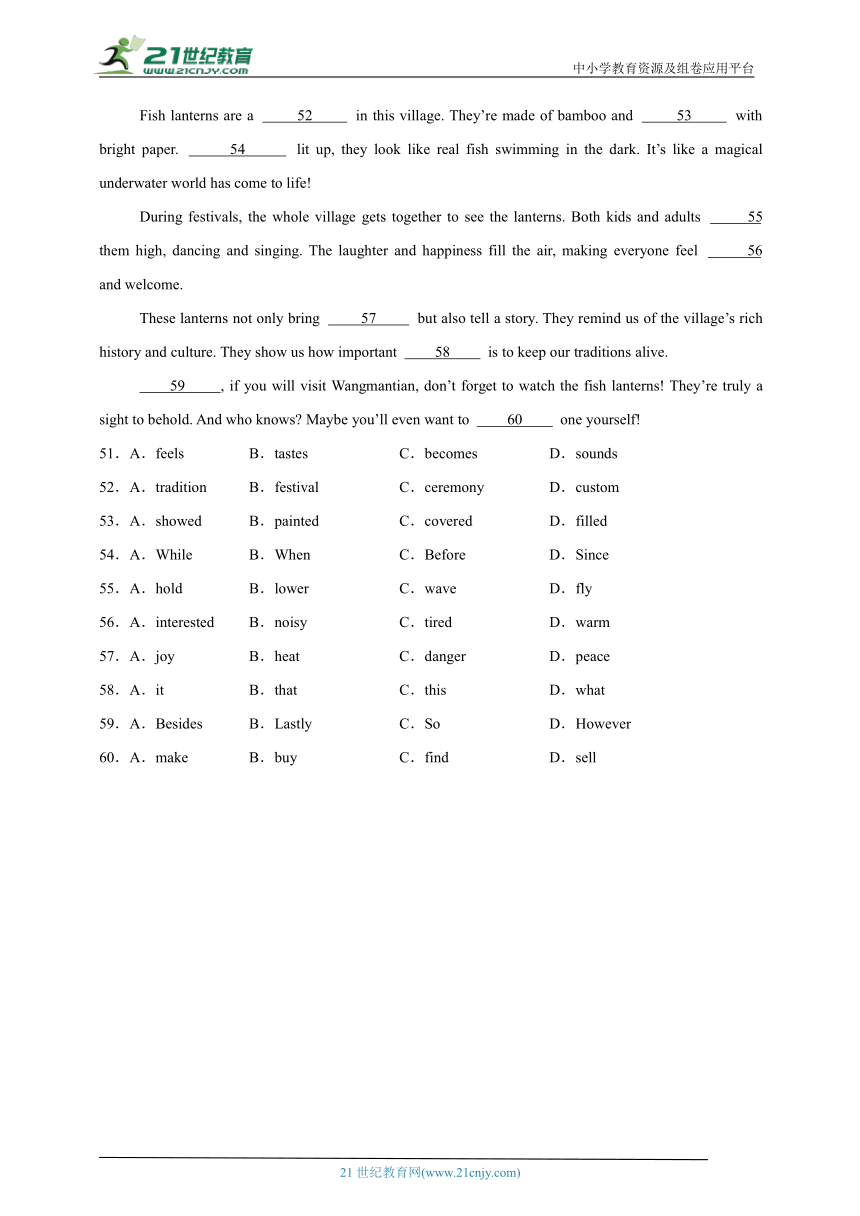
文档简介
中小学教育资源及组卷应用平台
完形填空-- 中华文化 专题练
2025年中考英语一轮复习备考
一、完形填空
Traditional Chinese medicine (TCM) is magic to me. My interest in it came from my 1 . Years ago, I often had headaches, and my life was seriously influenced. I 2 many different methods. However, none of them 3 . Luckily, I met with a doctor of TCM during my trip in China. He advised me to take some Chinese medicine. So I did. To my surprise, my 4 was gone within a week.
Later, I found that TCM could be of great help to some 5 lasting for a long time, such as sleeping problems or physical pains. The 6 methods in TCM also took my wife’s interest. With her 7 , I’m running a website to introduce TCM. I want to help people understand that if they have some 8 problems, they can try TCM.
All these experiences with TCM led me to 9 ancient Chinese philosophy (哲学), for many of TCM ideas, such as yin and yang, and qi, were 10 inspired (启发) by it. Since then, I have stepped onto the road to learning about Chinese culture.
1.A.habit B.education C.service D.experience
2.A.reported B.tried C.kept D.taught
3.A.worked B.started C.failed D.appeared
4.A.wealth B.courage C.chance D.pain
5.A.illnesses B.hobbies C.projects D.abilities
6.A.expensive B.helpful C.social D.blind
7.A.check B.worry C.support D.doubt
8.A.health B.food C.family D.job
9.A.drop B.write C.study D.create
10.A.recently B.rapidly C.suddenly D.directly
The sweetest memory of my childhood is about a round table. When the night 11 , my whole family always got together on different traditional festivals to have dinner when I was still little. We were sitting around or playing hide-and-seek (捉迷藏) under the table 12 the grown-ups were having a talk.
When I got a bit older, my aunt brought back her boyfriend and my grandma happily added another 13 to the round table. It seemed a little more crowded, but we all felt much 14 to each other. When I was twelve, my grandpa 15 . That made us feel sad. However, when the whole family 16 once again, we all agreed that his chair, bowl and chopsticks should remain the same. Though his seat was 17 we felt like that he had never left us.
We all have a table like this in our families. It is a (an) 18 of reunion (团聚) of our family and it shows our feelings. Although the reasons why we come together may be different, the feelings 19 it are the same. The round table has been a symbol of the Chinese feelings. It was, it is and will 20 be.
11.A.fell B.kept C.stayed D.cleared
12.A.after B.before C.since D.while
13.A.bed B.seat C.desk D.shelf
14.A.far B.close C.farther D.closer
15.A.left B.died C.cried D.smiled
16.A.went out B.got off C.got together D.fell asleep
17.A.old B.dirty C.cold D.empty
18.A.sign B.time C.idea D.place
19.A.at B.on C.behind D.against
20.A.often B.always C.never D.sometimes
The TV show China in the Classics (《典籍里的中国》) has been very popular since it first 21 on CCTV. Not only has it made people learn a lot about classic Chinese books, but it has aroused (激发) their 22 in reading these books.
The TV show includes 1l parts and each part is about one classic Chinese book. It meets people’s needs for 23 at a deep level. The first part introduces Shangshu. It is one of the most 24 classic Chinese books of ancient times. 25 the TV show, people can know what it is about and how it has been passed down from one generation (一代人) to another.
A man named Fu Sheng made a great contribution (贡献) to 26 and passing down the book. He took the risk of losing his life to hide it in the wall of an old house during the Qin Dynasty. He didn’t take it out until the Han Dynasty was 27 in 202 BC. Thanks to Fu Sheng’s hard work, people today can still read this book, 28 some parts were lost at that time. He will never be 29 . Many people in modern times know 30 about the book Shangshu. From the TV show, they can learn a lot about it.
21.A.scored B.allowed C.appeared D.connected
22.A.pride B.interest C.peace D.progress
23.A.culture B.change C.wealth D.success
24.A.careful B.delicious C.important D.comfortable
25.A.With B.About C.Under D.Through
26.A.protecting B.noticing C.touching D.respecting
27.A.set up B.got into C.looked after D.turned on
28.A.so B.if C.because D.though
29.A.sung B.hated C.forgotten D.remembered
30.A.much B.little C.a lot D.all
Hanfu has become popular again in China. A growing number of young people are now 31 wearing the traditional Han Chinese clothing. The style (式样) has even 32 some foreigners. Among them is Rian, a young man from Britain.
Rian teaches English in a school in Nanjing. In the city people are often 33 in the streets wearing Hanfu. Over time, he 34 a strong interest in it and wanted to have a try. “My first 35 of Hanfu was the Tang style,” said the young man. “Today, it is still my favorite, Hanfu style.” When he puts it on, he feels 36 he has traveled back to ancient times.
Rian’s interest in Hanfu has also helped him to learn more about China. In the past he knew China has a long 37 and great culture. He didn’t 38 more besides that. But Hanfu has shown him a lot more facts about Chinese culture.
Rian plans to stay in Nanjing for at least another five years. He’ll continue to work as an English teacher while 39 short videos about Hanfu. He hopes more people will learn about Hanfu and China through his 40 . “I want to share Chinese culture with the world.” said the Englishman.
31.A.probably B.patiently C.proudly D.highly
32.A.taken care of B.drawn attention of C.caught sight of D.got hold of
33.A.seen B.forgotten C.enjoyed D.shown
34.A.developed B.trained C.needed D.directed
35.A.secret B.prize C.work D.taste
36.A.as if B.even though C.as for D.such as
37.A.education B.tradition C.history D.custom
38.A.add B.share C.know D.teach
39.A.making B.forming C.watching D.setting
40.A.suggestions B.videos C.surveys D.notes
Jianzi is a traditional Chinese sport, with a long history of over 2000 years. It shares the same origin (起源) with British football. Both of them come from the 41 Chinese game—Cuju.
Jianzi kicking has been a popular activity in China. People of all 42 enjoy playing it, either old or young. People can play it alone or in groups. The rule is simple: Keep Jianzi in the air by using any part of your body 43 your hands.
A traditional Jianzi is made of several pieces: feathers (羽毛), 44 and cloth (布料). Soft and 45 feathers are often chosen to make Jianzi jump higher. In order to make the feather last longer, people would put the feather in the water with Sichuan pepper (胡椒) for some days. It’s said that pepper can 46 feathers from insects (昆虫). Modern Jianzi use rubber (橡胶) to carry the feather to 47 cost. But in the past, people like to use coins with holes to 48 the feather, as coins means wealth and good luck. Then feathers are sewn (缝) to the coin with cloth. Because ancient people believe that 49 shouldn’t be shown to others.
Jianzi has been considered as a Chinese 50 treasure. Today, kicking Jianzi is not only for fun but also a way of passing on traditional art.
41.A.future B.modern C.ancient D.present
42.A.grades B.places C.years D.ages
43.A.with B.besides C.except D.including
44.A.rocks B.sticks C.glasses D.coins
45.A.colorful B.big C.heavy D.light
46.A.result B.protect C.learn D.suffer
47.A.reduce B.cover C.increase D.pay
48.A.carry B.take C.bring D.hide
49.A.health B.wealth C.power D.speed
50.A.proper B.national C.private D.last
In the south of Anhui, there’s a special village called Wangmantian. Each year, it 51 alive with the brightest stars—not in the sky, but on the ground! These are the fish lanterns of Wangmantian.
Fish lanterns are a 52 in this village. They’re made of bamboo and 53 with bright paper. 54 lit up, they look like real fish swimming in the dark. It’s like a magical underwater world has come to life!
During festivals, the whole village gets together to see the lanterns. Both kids and adults 55 them high, dancing and singing. The laughter and happiness fill the air, making everyone feel 56 and welcome.
These lanterns not only bring 57 but also tell a story. They remind us of the village’s rich history and culture. They show us how important 58 is to keep our traditions alive.
59 , if you will visit Wangmantian, don’t forget to watch the fish lanterns! They’re truly a sight to behold. And who knows Maybe you’ll even want to 60 one yourself!
51.A.feels B.tastes C.becomes D.sounds
52.A.tradition B.festival C.ceremony D.custom
53.A.showed B.painted C.covered D.filled
54.A.While B.When C.Before D.Since
55.A.hold B.lower C.wave D.fly
56.A.interested B.noisy C.tired D.warm
57.A.joy B.heat C.danger D.peace
58.A.it B.that C.this D.what
59.A.Besides B.Lastly C.So D.However
60.A.make B.buy C.find D.sell
参考答案
1.D 2.B 3.A 4.D 5.A 6.B 7.C 8.A 9.C 10.D
1.句意:多年前,我经常头痛,生活受到严重影响。
habit习惯;education教育;service服务;experience经历。根据“Years ago, I often had headaches, and my life was seriously influenced”以及下文可知,这是介绍作者的经历,故选D。
2.句意:我尝试了许多不同的方法。
reported报告;tried尝试;kept保持;taught教。根据“... many different methods. However, none of them ”可知,作者尝试了很多不同的方法治疗头痛,故选B。
3.句意:然而,它们都不起作用。
worked起作用;started开始;failed失败;appeared出现。根据“However, none of them...”可知,这些方法都不起作用,故选A。
4.句意:令我惊讶的是,我的疼痛在一周内消失了。
wealth财富;courage勇气;chance机会;pain痛苦。根据“He advised me to take some Chinese medicine.”可知,作者看了中医后,头痛消失了,故选D。
5.句意:后来,我发现中医对一些长期的疾病有很大的帮助,比如睡眠问题或身体疼痛。
illnesses疾病;hobbies爱好;projects项目;abilities能力。根据“such as sleeping problems or physical pains”可知,这些都属于长期疾病,故选A。
6.句意:中医有用的方法也引起了我妻子的兴趣。
expensive昂贵的;helpful有帮助的;social社会的;blind盲的。根据“took my wife’s interest”结合上文介绍作者的头痛在中医的帮助下治好了可知,这种方法是有用的,故选B。
7.句意:在她的支持下,我经营了一个介绍中医的网站。
check检查;worry担心;support支持;doubt怀疑。根据“took my wife’s interest”可知,作者的妻子支持作者,故选C。
8.句意:我想帮助健康的人明白,如果他们有问题,他们可以尝试中医。
health健康;food食物;family家庭;job工作。根据“they can try TCM”可知,有健康问题可以尝试中医,故选A。
9.句意:所有这些中医的经历促使我学习中国古代哲学,因为中医的许多思想,如阴阳和气,都是直接受到它的启发。
drop掉落;write写;study学习;create创造。根据“ancient Chinese philosophy (哲学)”可知,作者开始学习中国古代哲学,故选C。
10.句意:所有这些中医的经历促使我学习中国古代哲学,因为中医的许多思想,如阴阳和气,都是直接受到它的启发。
recently最近;rapidly快速地;suddenly突然地;directly直接地。根据“for many of TCM ideas, such as yin and yang, and qi, were...inspired (启发) by it.”可知,中医的许多思想都会直接受到中国古代哲学的启发,故选D。
11.A 12.D 13.B 14.D 15.B 16.C 17.D 18.A 19.C 20.B
11.句意:在我还小的时候,当夜幕降临的时,我的家人总是在不同的传统节日里聚在一起吃晚饭。
fell降落;kept保持;stayed停留;cleared清理。根据“the night”可知,此处指夜幕降临,应用fell。故选A。
12.句意:大人们聊天的时候,我们围坐在桌子底下玩捉迷藏。
after在……之后;before在……以前;since自从;while与……同时。根据“We were sitting around or playing hide-and-seek (捉迷藏) under the table ... the grown-ups were having a talk.”可知,我们小孩子玩捉迷藏时,大人们在聊天,用while引导时间状语从句。故选D。
13.句意:当我再大一点的时候,姑姑把她的男朋友带回来了,奶奶高兴地在圆桌上又加了一个座位。
bed床;seat位置;desk书桌;shelf架子。根据“It seemed a little more crowded”可知,此处指加了一个座位。故选B。
14.句意:似乎有点拥挤,但我们都觉得彼此更近了。
far远的;close 靠近的;farther更远;closer更近。根据“It seemed a little more crowded, but we all felt much ... to each other.”可知,我们感觉彼此之间的距离更近了,much后应跟比较级,所以用用closer。故选D。
15.句意:我十二岁的时候,爷爷去世了。
left离开;died死亡;cried哭泣;smiled微笑。根据“That made us feel sad.”可知,作者的爷爷去世了。故选B。
16.句意:然而,当全家人再次聚在一起时,我们一致认为他的椅子、碗和筷子应该保持不变。
went out外出;got off下车;got together聚在一起;fell asleep入睡。根据“my whole family always got together on different traditional festivals”和“once again”可知,此处指家人聚集在一起。故选C。
17.句意:虽然他的座位是空的,但我们觉得他从未离开过我们。
old老的;dirty脏的;cold寒冷的;empty空的。根据上文爷爷逝世和“his chair, bowl and chopsticks should remain the same”可知,爷爷的座位是空的。故选D。
18.句意:它是我们家庭团聚的标志,它表达了我们的感情。
sign标志;time时间;idea主意;place地方。根据“We all have a table like this in our families.”可知,此处指桌子是家庭团聚的标志。故选A。
19.句意:虽然我们走到一起的原因可能不同,但背后的感情是一样的。
at在;on在……上面;behind在……后面;against靠着。根据“the feelings ... it are the same.”可知,此处指桌子背后的情感。故选C。
20.句意:过去是,现在是,将来也永远是。
often经常;always总是;never从不;sometimes有时。根据“The round table has been a symbol of the Chinese feelings.”可知,圆桌一直是中国人感情的象征,过去是、现在时,未来也是,always符合语境。故选B。
21.C 22.B 23.A 24.C 25.D 26.A 27.A 28.D 29.C 30.B
21.句意:电视节目《典籍里的中国》自从在中央电视台播出以来就非常受欢迎。
scored得分;allowed允许;appeared出现;connected连接。根据“it first ...on CCTV ”可知,此处指在电视节目上第一次出现,故选C。
22.句意:它不仅使人们了解了许多中国经典书籍,而且激发了人们阅读这些书籍的兴趣。
pride骄傲;interest兴趣;peace和平;progress进步。根据“it has aroused (激发) their ... in reading these books”可知,节目激发了人们的阅读兴趣,故选B。
23.句意:它从深层次上满足了人们对文化的需求。
culture文化;change改变;wealth财富;success成功。根据“each part is about one classic Chinese book”可知,节目满足了人们对文化的需求,故选A。
24.句意:它是中国古代最重要的经典书籍之一。
careful仔细的;delicious美味的;important重要的;comfortable舒服的。根据“The first part introduces Shangshu.”及常识可知,《尚书》是中国古代最重要的经典书籍之一,故选C。
25.句意:通过电视节目,人们可以知道它是关于什么的,以及它是如何代代相传的。
With带有;About关于;Under在……下面;Through通过。根据“people can know what it is about and how it has been passed down from one generation (一代人) to another.”可知,人们知道这本书是关于什么的,以及它是如何代代相传,是通过观看节目这种方式得知的。故选D。
26.句意:一个叫伏生的人为保护和传承这本书做出了巨大的贡献。
protecting保护;noticing注意;touching触摸;respecting尊重。根据“He took the risk of losing his life to hide it in the wall of an old house during the Qin Dynasty.”可知,他冒着失去生命的危险把它藏在秦朝一所老房子的墙上,即他保护了《尚书》,故选A。
27.句意:直到公元前202年汉朝建立,他才把它拿出来。
set up建立;got into走进;looked after照顾;turned on打开。根据“during the Qin Dynasty. He didn’t take it out until the Han Dynasty was ... in 202 BC.”可知,直到汉朝被建立,他才把书拿出来。故选A。
28.句意:由于伏生的辛勤劳动,今天的人们仍然可以阅读这本书,尽管有些部分在当时已经丢失了。
so因此;if如果;because因为;though尽管。根据“people today can still read this book, ... some parts were lost at that time.”可知,前后句为让步关系,故应用though引导让步状语从句。故选D。
29.句意:他永远不会被忘记。
sung唱歌;hated讨厌;forgotten忘记;remembered记住。根据上文“Thanks to Fu Sheng’s hard work, people today can still read this book”可知,他永远不会被遗忘。故选C。
30.句意:现代许多人对《尚书》知之甚少。
much很多;little很少;a lot很多;all全部。根据“From the TV show, they can learn a lot about it.”可知,现在许多人对《尚书》了解很少。故选B。
31.C 32.B 33.A 34.A 35.D 36.A 37.C 38.C 39.A 40.B
31.句意:现在,越来越多的年轻人自豪地穿着汉人的传统服装。
probably可能;patiently耐心地;proudly自豪地;highly非常。根据“Hanfu has become popular again in China”可知是指越来越多的年轻人自豪地穿着汉人的传统服装。故选C。
32.句意:这种风格甚至引起了一些外国人的注意。
taken care of照顾;drawn attention of引起注意;caught sight of看见;got hold of抓住。根据“The style (式样) has even…some foreigners.”可知是指这种风格甚至引起了一些外国人的注意。故选B。
33.句意:在这个城市里,经常可以看到人们穿着汉服走在街上。
seen看见;forgotten忘记;enjoyed享受;shown展示。根据“people are often…in the streets wearing Hanfu”可知是指经常可以看到人们穿着汉服走在街上。故选A。
34.句意:随着时间的推移,他对它产生了浓厚的兴趣,并想试一试。
developed开始形成;trained训练;needed需要;directed指导。根据“he…a strong interest in it and wanted to have a try”可知是指他对它产生了浓厚的兴趣,故选A。
35.句意:我第一次体验的汉服是唐式的。
secret秘密;prize奖励;work工作;taste体验。根据“wanted to have a try”可知是指第一次体验的汉服是唐式的。故选D。
36.句意:当他穿上它时,他感觉自己仿佛回到了古代。
as if似乎;even though即使;as for至于;such as比如。根据“he has traveled back to ancient times”可知是指感觉自己仿佛回到了古代。故选A。
37.句意:过去,他知道中国有着悠久的历史和伟大的文化。
education教育;tradition传统;history历史;custom习俗。根据“China has a long”可知是指中国有着悠久的历史,故选C。
38.句意:除此之外,他不知道更多。
add增加;share分享;know知道;teach教。根据“In the past he knew China…”以及“But Hanfu has shown him a lot more facts about Chinese culture.”可知除此之外,他不知道更多,故选C。
39.句意:他将继续担任英语教师,同时制作关于汉服的视频。
making制作;forming形成;watching看;setting安置。根据“short videos about Hanfu”可知是指制作关于汉服的视频。故选A。
40.句意:他希望更多的人通过他的视频了解汉服和中国。
suggestions建议;videos视频;surveys调查;notes笔记。根据“short videos about Hanfu”可知是指通过他的视频了解汉服和中国。故选B。
41.C 42.D 43.C 44.D 45.D 46.B 47.A 48.A 49.B 50.B
41.句意:这两种游戏都来自中国古代的游戏——蹴鞠。
future未来;modern现代的;ancient古代的;present目前。根据“Chinese game—Cuju”可知是指中国古代的游戏——蹴鞠。故选C。
42.句意:所有年龄段的人,无论老少,都喜欢玩这项运动。
grades成绩等级;places地方;years年;ages年龄。根据“either old or young”可知是指所有年龄段的人,故选D。
43.句意:除了你的手,用你身体的任何部位保持毽子在空中。
with和;besides而且;except除了;including包括。根据“Keep Jianzi in the air by using any part of your body…your hands.”以及结合常识,可知是指除了你的手,用你身体的任何部位保持毽子在空中。故选C。
44.句意:传统的毽子由几块组成:羽毛、硬币和布料。
rocks岩石;sticks枝条;glasses玻璃杯;coins硬币。根据“But in the past, people like to use coins with holes”可知它还由硬币组成,故选D。
45.句意:柔软而轻的羽毛经常被选来让毽子蹦得更高。
colorful多彩的;big大的;heavy重的;light轻的。根据“make Jianzi jump higher”可知是指柔软而轻的羽毛经常被选来让毽子蹦得更高。故选D。
46.句意:据说胡椒可以保护羽毛不受虫害。
result结果;protect保护;learn学习;suffer遭受。根据“It’s said that pepper can…feathers from insects”可知是指胡椒可以保护羽毛不受虫害。故选B。
47.句意:现代的毽子用橡胶承载羽毛,以降低成本。
reduce减少;cover覆盖;increase增加;pay支付。根据“Modern Jianzi use rubber (橡胶) to carry the feather to…cost.”可知是指用橡胶携带羽毛,以降低成本。故选A。
48.句意:但在过去,人们喜欢用有洞的硬币来承载羽毛,因为硬币意味着财富和好运。
carry携带;take拿;bring带来;hide隐藏。根据“people like to use coins with holes to…the feather”以及结合“Modern Jianzi use rubber (橡胶) to carry the feather to”可知是指人们喜欢用有洞的硬币来承载羽毛,故选A。
49.句意:因为古人认为财富不应该展示给别人。
health健康;wealth财富;power能量;speed速度。根据“Then feathers are sewn (缝) to the coin with cloth.”可知是指古人认为财富不应该展示给别人。故选B。
50.句意:毽子被认为是中国的国宝。
proper合适的;national国家的;private私人的;last最后的。根据“Today, kicking Jianzi is not only for fun but also a way of passing on traditional art.”可知是指是中国的国宝。故选B。
51.C 52.A 53.C 54.B 55.A 56.D 57.A 58.A 59.C 60.A
51.句意:每年,它都充满了最明亮的星星——不是在天上,而是在地上!
feels感觉;tastes尝起来;becomes变得,成为;sounds听起来。become alive with意为“充满”。故选C。
52.句意:鱼灯是这个村子的传统。
tradition传统;festival节日;ceremony仪式;custom习俗。根据下文“They show us how important...is to keep our traditions alive.”可推知,此处表示鱼灯是这个村子的传统。故选A。
53.句意:它们由竹子制成,外面覆盖着光亮的纸。
showed展示;painted用颜料画;covered覆盖;filled充满。根据“They’re made of bamboo and...with bright paper.”可知,此处表示鱼灯外面覆盖着光亮的纸。be covered wtih意为“被……覆盖”。故选C。
54.句意:当被点亮时,它们看起来就像真正的鱼在黑暗中游动。
While与……同时;When当……的时候;Before在……之前;Since自从。分析“...lit up, they look like real fish swimming in the dark.”可知,此处表示当鱼灯被点亮时,它们看起来就像真正的鱼在黑暗中游动。空格处意为“当……的时候”,when符合语境。故选B。
55.句意:孩子和大人都把它们高高举起,载歌载舞。
hold拿着;lower降低;wave挥舞;fly飞。根据“Both kids and adults...them high”和选项可知,此处表示把鱼灯高高举起。hold sth. high意为“高举某物”。故选A。
56.句意:空气中充满了笑声和快乐,使每个人都感到温暖和受到欢迎。
interested感兴趣的;noisy吵闹的;tired疲惫的;warm温暖的。根据“The laughter and happiness fill the air”可知,空气中充满了笑声和快乐,这会使人感到温暖。故选D。
57.句意:这些灯笼不仅带来欢乐,还讲述了一个故事。
joy欢乐;heat热;danger危险;peace和平。结合选项和上文“The laughter and happiness fill the air”可知,此处表示鱼灯会带来欢乐。故选A。
58.句意:他们告诉我们保留我们的传统是多么重要。
it它;that那;this这;what什么。分析“how important...is to keep our traditions alive”可知,空格处应用it作形式主语,动词不定式是真正的主语。故选A。
59.句意:因此,如果你要去参观汪满田村,别忘了观看鱼灯!
Besides此外;Lastly最后;So因此;However然而。根据上文可知,鱼灯是汪满田村的传统,它让人们想起这个村庄丰富的历史和文化。结合“...if you will visit Wangmantian, don’t forget to watch the fish lanterns!”可知,此处和上文是因果关系,前因后果,空格处意为“因此”。故选C。
60.句意:也许你甚至想自己做一个!
make制作;buy买;find发现;sell卖。结合选项和“Maybe you’ll even want to...one yourself!”可知,此处表示也许你甚至想自己做一个。故选A。
21世纪教育网 www.21cnjy.com 精品试卷·第 2 页 (共 2 页)
21世纪教育网(www.21cnjy.com)
完形填空-- 中华文化 专题练
2025年中考英语一轮复习备考
一、完形填空
Traditional Chinese medicine (TCM) is magic to me. My interest in it came from my 1 . Years ago, I often had headaches, and my life was seriously influenced. I 2 many different methods. However, none of them 3 . Luckily, I met with a doctor of TCM during my trip in China. He advised me to take some Chinese medicine. So I did. To my surprise, my 4 was gone within a week.
Later, I found that TCM could be of great help to some 5 lasting for a long time, such as sleeping problems or physical pains. The 6 methods in TCM also took my wife’s interest. With her 7 , I’m running a website to introduce TCM. I want to help people understand that if they have some 8 problems, they can try TCM.
All these experiences with TCM led me to 9 ancient Chinese philosophy (哲学), for many of TCM ideas, such as yin and yang, and qi, were 10 inspired (启发) by it. Since then, I have stepped onto the road to learning about Chinese culture.
1.A.habit B.education C.service D.experience
2.A.reported B.tried C.kept D.taught
3.A.worked B.started C.failed D.appeared
4.A.wealth B.courage C.chance D.pain
5.A.illnesses B.hobbies C.projects D.abilities
6.A.expensive B.helpful C.social D.blind
7.A.check B.worry C.support D.doubt
8.A.health B.food C.family D.job
9.A.drop B.write C.study D.create
10.A.recently B.rapidly C.suddenly D.directly
The sweetest memory of my childhood is about a round table. When the night 11 , my whole family always got together on different traditional festivals to have dinner when I was still little. We were sitting around or playing hide-and-seek (捉迷藏) under the table 12 the grown-ups were having a talk.
When I got a bit older, my aunt brought back her boyfriend and my grandma happily added another 13 to the round table. It seemed a little more crowded, but we all felt much 14 to each other. When I was twelve, my grandpa 15 . That made us feel sad. However, when the whole family 16 once again, we all agreed that his chair, bowl and chopsticks should remain the same. Though his seat was 17 we felt like that he had never left us.
We all have a table like this in our families. It is a (an) 18 of reunion (团聚) of our family and it shows our feelings. Although the reasons why we come together may be different, the feelings 19 it are the same. The round table has been a symbol of the Chinese feelings. It was, it is and will 20 be.
11.A.fell B.kept C.stayed D.cleared
12.A.after B.before C.since D.while
13.A.bed B.seat C.desk D.shelf
14.A.far B.close C.farther D.closer
15.A.left B.died C.cried D.smiled
16.A.went out B.got off C.got together D.fell asleep
17.A.old B.dirty C.cold D.empty
18.A.sign B.time C.idea D.place
19.A.at B.on C.behind D.against
20.A.often B.always C.never D.sometimes
The TV show China in the Classics (《典籍里的中国》) has been very popular since it first 21 on CCTV. Not only has it made people learn a lot about classic Chinese books, but it has aroused (激发) their 22 in reading these books.
The TV show includes 1l parts and each part is about one classic Chinese book. It meets people’s needs for 23 at a deep level. The first part introduces Shangshu. It is one of the most 24 classic Chinese books of ancient times. 25 the TV show, people can know what it is about and how it has been passed down from one generation (一代人) to another.
A man named Fu Sheng made a great contribution (贡献) to 26 and passing down the book. He took the risk of losing his life to hide it in the wall of an old house during the Qin Dynasty. He didn’t take it out until the Han Dynasty was 27 in 202 BC. Thanks to Fu Sheng’s hard work, people today can still read this book, 28 some parts were lost at that time. He will never be 29 . Many people in modern times know 30 about the book Shangshu. From the TV show, they can learn a lot about it.
21.A.scored B.allowed C.appeared D.connected
22.A.pride B.interest C.peace D.progress
23.A.culture B.change C.wealth D.success
24.A.careful B.delicious C.important D.comfortable
25.A.With B.About C.Under D.Through
26.A.protecting B.noticing C.touching D.respecting
27.A.set up B.got into C.looked after D.turned on
28.A.so B.if C.because D.though
29.A.sung B.hated C.forgotten D.remembered
30.A.much B.little C.a lot D.all
Hanfu has become popular again in China. A growing number of young people are now 31 wearing the traditional Han Chinese clothing. The style (式样) has even 32 some foreigners. Among them is Rian, a young man from Britain.
Rian teaches English in a school in Nanjing. In the city people are often 33 in the streets wearing Hanfu. Over time, he 34 a strong interest in it and wanted to have a try. “My first 35 of Hanfu was the Tang style,” said the young man. “Today, it is still my favorite, Hanfu style.” When he puts it on, he feels 36 he has traveled back to ancient times.
Rian’s interest in Hanfu has also helped him to learn more about China. In the past he knew China has a long 37 and great culture. He didn’t 38 more besides that. But Hanfu has shown him a lot more facts about Chinese culture.
Rian plans to stay in Nanjing for at least another five years. He’ll continue to work as an English teacher while 39 short videos about Hanfu. He hopes more people will learn about Hanfu and China through his 40 . “I want to share Chinese culture with the world.” said the Englishman.
31.A.probably B.patiently C.proudly D.highly
32.A.taken care of B.drawn attention of C.caught sight of D.got hold of
33.A.seen B.forgotten C.enjoyed D.shown
34.A.developed B.trained C.needed D.directed
35.A.secret B.prize C.work D.taste
36.A.as if B.even though C.as for D.such as
37.A.education B.tradition C.history D.custom
38.A.add B.share C.know D.teach
39.A.making B.forming C.watching D.setting
40.A.suggestions B.videos C.surveys D.notes
Jianzi is a traditional Chinese sport, with a long history of over 2000 years. It shares the same origin (起源) with British football. Both of them come from the 41 Chinese game—Cuju.
Jianzi kicking has been a popular activity in China. People of all 42 enjoy playing it, either old or young. People can play it alone or in groups. The rule is simple: Keep Jianzi in the air by using any part of your body 43 your hands.
A traditional Jianzi is made of several pieces: feathers (羽毛), 44 and cloth (布料). Soft and 45 feathers are often chosen to make Jianzi jump higher. In order to make the feather last longer, people would put the feather in the water with Sichuan pepper (胡椒) for some days. It’s said that pepper can 46 feathers from insects (昆虫). Modern Jianzi use rubber (橡胶) to carry the feather to 47 cost. But in the past, people like to use coins with holes to 48 the feather, as coins means wealth and good luck. Then feathers are sewn (缝) to the coin with cloth. Because ancient people believe that 49 shouldn’t be shown to others.
Jianzi has been considered as a Chinese 50 treasure. Today, kicking Jianzi is not only for fun but also a way of passing on traditional art.
41.A.future B.modern C.ancient D.present
42.A.grades B.places C.years D.ages
43.A.with B.besides C.except D.including
44.A.rocks B.sticks C.glasses D.coins
45.A.colorful B.big C.heavy D.light
46.A.result B.protect C.learn D.suffer
47.A.reduce B.cover C.increase D.pay
48.A.carry B.take C.bring D.hide
49.A.health B.wealth C.power D.speed
50.A.proper B.national C.private D.last
In the south of Anhui, there’s a special village called Wangmantian. Each year, it 51 alive with the brightest stars—not in the sky, but on the ground! These are the fish lanterns of Wangmantian.
Fish lanterns are a 52 in this village. They’re made of bamboo and 53 with bright paper. 54 lit up, they look like real fish swimming in the dark. It’s like a magical underwater world has come to life!
During festivals, the whole village gets together to see the lanterns. Both kids and adults 55 them high, dancing and singing. The laughter and happiness fill the air, making everyone feel 56 and welcome.
These lanterns not only bring 57 but also tell a story. They remind us of the village’s rich history and culture. They show us how important 58 is to keep our traditions alive.
59 , if you will visit Wangmantian, don’t forget to watch the fish lanterns! They’re truly a sight to behold. And who knows Maybe you’ll even want to 60 one yourself!
51.A.feels B.tastes C.becomes D.sounds
52.A.tradition B.festival C.ceremony D.custom
53.A.showed B.painted C.covered D.filled
54.A.While B.When C.Before D.Since
55.A.hold B.lower C.wave D.fly
56.A.interested B.noisy C.tired D.warm
57.A.joy B.heat C.danger D.peace
58.A.it B.that C.this D.what
59.A.Besides B.Lastly C.So D.However
60.A.make B.buy C.find D.sell
参考答案
1.D 2.B 3.A 4.D 5.A 6.B 7.C 8.A 9.C 10.D
1.句意:多年前,我经常头痛,生活受到严重影响。
habit习惯;education教育;service服务;experience经历。根据“Years ago, I often had headaches, and my life was seriously influenced”以及下文可知,这是介绍作者的经历,故选D。
2.句意:我尝试了许多不同的方法。
reported报告;tried尝试;kept保持;taught教。根据“... many different methods. However, none of them ”可知,作者尝试了很多不同的方法治疗头痛,故选B。
3.句意:然而,它们都不起作用。
worked起作用;started开始;failed失败;appeared出现。根据“However, none of them...”可知,这些方法都不起作用,故选A。
4.句意:令我惊讶的是,我的疼痛在一周内消失了。
wealth财富;courage勇气;chance机会;pain痛苦。根据“He advised me to take some Chinese medicine.”可知,作者看了中医后,头痛消失了,故选D。
5.句意:后来,我发现中医对一些长期的疾病有很大的帮助,比如睡眠问题或身体疼痛。
illnesses疾病;hobbies爱好;projects项目;abilities能力。根据“such as sleeping problems or physical pains”可知,这些都属于长期疾病,故选A。
6.句意:中医有用的方法也引起了我妻子的兴趣。
expensive昂贵的;helpful有帮助的;social社会的;blind盲的。根据“took my wife’s interest”结合上文介绍作者的头痛在中医的帮助下治好了可知,这种方法是有用的,故选B。
7.句意:在她的支持下,我经营了一个介绍中医的网站。
check检查;worry担心;support支持;doubt怀疑。根据“took my wife’s interest”可知,作者的妻子支持作者,故选C。
8.句意:我想帮助健康的人明白,如果他们有问题,他们可以尝试中医。
health健康;food食物;family家庭;job工作。根据“they can try TCM”可知,有健康问题可以尝试中医,故选A。
9.句意:所有这些中医的经历促使我学习中国古代哲学,因为中医的许多思想,如阴阳和气,都是直接受到它的启发。
drop掉落;write写;study学习;create创造。根据“ancient Chinese philosophy (哲学)”可知,作者开始学习中国古代哲学,故选C。
10.句意:所有这些中医的经历促使我学习中国古代哲学,因为中医的许多思想,如阴阳和气,都是直接受到它的启发。
recently最近;rapidly快速地;suddenly突然地;directly直接地。根据“for many of TCM ideas, such as yin and yang, and qi, were...inspired (启发) by it.”可知,中医的许多思想都会直接受到中国古代哲学的启发,故选D。
11.A 12.D 13.B 14.D 15.B 16.C 17.D 18.A 19.C 20.B
11.句意:在我还小的时候,当夜幕降临的时,我的家人总是在不同的传统节日里聚在一起吃晚饭。
fell降落;kept保持;stayed停留;cleared清理。根据“the night”可知,此处指夜幕降临,应用fell。故选A。
12.句意:大人们聊天的时候,我们围坐在桌子底下玩捉迷藏。
after在……之后;before在……以前;since自从;while与……同时。根据“We were sitting around or playing hide-and-seek (捉迷藏) under the table ... the grown-ups were having a talk.”可知,我们小孩子玩捉迷藏时,大人们在聊天,用while引导时间状语从句。故选D。
13.句意:当我再大一点的时候,姑姑把她的男朋友带回来了,奶奶高兴地在圆桌上又加了一个座位。
bed床;seat位置;desk书桌;shelf架子。根据“It seemed a little more crowded”可知,此处指加了一个座位。故选B。
14.句意:似乎有点拥挤,但我们都觉得彼此更近了。
far远的;close 靠近的;farther更远;closer更近。根据“It seemed a little more crowded, but we all felt much ... to each other.”可知,我们感觉彼此之间的距离更近了,much后应跟比较级,所以用用closer。故选D。
15.句意:我十二岁的时候,爷爷去世了。
left离开;died死亡;cried哭泣;smiled微笑。根据“That made us feel sad.”可知,作者的爷爷去世了。故选B。
16.句意:然而,当全家人再次聚在一起时,我们一致认为他的椅子、碗和筷子应该保持不变。
went out外出;got off下车;got together聚在一起;fell asleep入睡。根据“my whole family always got together on different traditional festivals”和“once again”可知,此处指家人聚集在一起。故选C。
17.句意:虽然他的座位是空的,但我们觉得他从未离开过我们。
old老的;dirty脏的;cold寒冷的;empty空的。根据上文爷爷逝世和“his chair, bowl and chopsticks should remain the same”可知,爷爷的座位是空的。故选D。
18.句意:它是我们家庭团聚的标志,它表达了我们的感情。
sign标志;time时间;idea主意;place地方。根据“We all have a table like this in our families.”可知,此处指桌子是家庭团聚的标志。故选A。
19.句意:虽然我们走到一起的原因可能不同,但背后的感情是一样的。
at在;on在……上面;behind在……后面;against靠着。根据“the feelings ... it are the same.”可知,此处指桌子背后的情感。故选C。
20.句意:过去是,现在是,将来也永远是。
often经常;always总是;never从不;sometimes有时。根据“The round table has been a symbol of the Chinese feelings.”可知,圆桌一直是中国人感情的象征,过去是、现在时,未来也是,always符合语境。故选B。
21.C 22.B 23.A 24.C 25.D 26.A 27.A 28.D 29.C 30.B
21.句意:电视节目《典籍里的中国》自从在中央电视台播出以来就非常受欢迎。
scored得分;allowed允许;appeared出现;connected连接。根据“it first ...on CCTV ”可知,此处指在电视节目上第一次出现,故选C。
22.句意:它不仅使人们了解了许多中国经典书籍,而且激发了人们阅读这些书籍的兴趣。
pride骄傲;interest兴趣;peace和平;progress进步。根据“it has aroused (激发) their ... in reading these books”可知,节目激发了人们的阅读兴趣,故选B。
23.句意:它从深层次上满足了人们对文化的需求。
culture文化;change改变;wealth财富;success成功。根据“each part is about one classic Chinese book”可知,节目满足了人们对文化的需求,故选A。
24.句意:它是中国古代最重要的经典书籍之一。
careful仔细的;delicious美味的;important重要的;comfortable舒服的。根据“The first part introduces Shangshu.”及常识可知,《尚书》是中国古代最重要的经典书籍之一,故选C。
25.句意:通过电视节目,人们可以知道它是关于什么的,以及它是如何代代相传的。
With带有;About关于;Under在……下面;Through通过。根据“people can know what it is about and how it has been passed down from one generation (一代人) to another.”可知,人们知道这本书是关于什么的,以及它是如何代代相传,是通过观看节目这种方式得知的。故选D。
26.句意:一个叫伏生的人为保护和传承这本书做出了巨大的贡献。
protecting保护;noticing注意;touching触摸;respecting尊重。根据“He took the risk of losing his life to hide it in the wall of an old house during the Qin Dynasty.”可知,他冒着失去生命的危险把它藏在秦朝一所老房子的墙上,即他保护了《尚书》,故选A。
27.句意:直到公元前202年汉朝建立,他才把它拿出来。
set up建立;got into走进;looked after照顾;turned on打开。根据“during the Qin Dynasty. He didn’t take it out until the Han Dynasty was ... in 202 BC.”可知,直到汉朝被建立,他才把书拿出来。故选A。
28.句意:由于伏生的辛勤劳动,今天的人们仍然可以阅读这本书,尽管有些部分在当时已经丢失了。
so因此;if如果;because因为;though尽管。根据“people today can still read this book, ... some parts were lost at that time.”可知,前后句为让步关系,故应用though引导让步状语从句。故选D。
29.句意:他永远不会被忘记。
sung唱歌;hated讨厌;forgotten忘记;remembered记住。根据上文“Thanks to Fu Sheng’s hard work, people today can still read this book”可知,他永远不会被遗忘。故选C。
30.句意:现代许多人对《尚书》知之甚少。
much很多;little很少;a lot很多;all全部。根据“From the TV show, they can learn a lot about it.”可知,现在许多人对《尚书》了解很少。故选B。
31.C 32.B 33.A 34.A 35.D 36.A 37.C 38.C 39.A 40.B
31.句意:现在,越来越多的年轻人自豪地穿着汉人的传统服装。
probably可能;patiently耐心地;proudly自豪地;highly非常。根据“Hanfu has become popular again in China”可知是指越来越多的年轻人自豪地穿着汉人的传统服装。故选C。
32.句意:这种风格甚至引起了一些外国人的注意。
taken care of照顾;drawn attention of引起注意;caught sight of看见;got hold of抓住。根据“The style (式样) has even…some foreigners.”可知是指这种风格甚至引起了一些外国人的注意。故选B。
33.句意:在这个城市里,经常可以看到人们穿着汉服走在街上。
seen看见;forgotten忘记;enjoyed享受;shown展示。根据“people are often…in the streets wearing Hanfu”可知是指经常可以看到人们穿着汉服走在街上。故选A。
34.句意:随着时间的推移,他对它产生了浓厚的兴趣,并想试一试。
developed开始形成;trained训练;needed需要;directed指导。根据“he…a strong interest in it and wanted to have a try”可知是指他对它产生了浓厚的兴趣,故选A。
35.句意:我第一次体验的汉服是唐式的。
secret秘密;prize奖励;work工作;taste体验。根据“wanted to have a try”可知是指第一次体验的汉服是唐式的。故选D。
36.句意:当他穿上它时,他感觉自己仿佛回到了古代。
as if似乎;even though即使;as for至于;such as比如。根据“he has traveled back to ancient times”可知是指感觉自己仿佛回到了古代。故选A。
37.句意:过去,他知道中国有着悠久的历史和伟大的文化。
education教育;tradition传统;history历史;custom习俗。根据“China has a long”可知是指中国有着悠久的历史,故选C。
38.句意:除此之外,他不知道更多。
add增加;share分享;know知道;teach教。根据“In the past he knew China…”以及“But Hanfu has shown him a lot more facts about Chinese culture.”可知除此之外,他不知道更多,故选C。
39.句意:他将继续担任英语教师,同时制作关于汉服的视频。
making制作;forming形成;watching看;setting安置。根据“short videos about Hanfu”可知是指制作关于汉服的视频。故选A。
40.句意:他希望更多的人通过他的视频了解汉服和中国。
suggestions建议;videos视频;surveys调查;notes笔记。根据“short videos about Hanfu”可知是指通过他的视频了解汉服和中国。故选B。
41.C 42.D 43.C 44.D 45.D 46.B 47.A 48.A 49.B 50.B
41.句意:这两种游戏都来自中国古代的游戏——蹴鞠。
future未来;modern现代的;ancient古代的;present目前。根据“Chinese game—Cuju”可知是指中国古代的游戏——蹴鞠。故选C。
42.句意:所有年龄段的人,无论老少,都喜欢玩这项运动。
grades成绩等级;places地方;years年;ages年龄。根据“either old or young”可知是指所有年龄段的人,故选D。
43.句意:除了你的手,用你身体的任何部位保持毽子在空中。
with和;besides而且;except除了;including包括。根据“Keep Jianzi in the air by using any part of your body…your hands.”以及结合常识,可知是指除了你的手,用你身体的任何部位保持毽子在空中。故选C。
44.句意:传统的毽子由几块组成:羽毛、硬币和布料。
rocks岩石;sticks枝条;glasses玻璃杯;coins硬币。根据“But in the past, people like to use coins with holes”可知它还由硬币组成,故选D。
45.句意:柔软而轻的羽毛经常被选来让毽子蹦得更高。
colorful多彩的;big大的;heavy重的;light轻的。根据“make Jianzi jump higher”可知是指柔软而轻的羽毛经常被选来让毽子蹦得更高。故选D。
46.句意:据说胡椒可以保护羽毛不受虫害。
result结果;protect保护;learn学习;suffer遭受。根据“It’s said that pepper can…feathers from insects”可知是指胡椒可以保护羽毛不受虫害。故选B。
47.句意:现代的毽子用橡胶承载羽毛,以降低成本。
reduce减少;cover覆盖;increase增加;pay支付。根据“Modern Jianzi use rubber (橡胶) to carry the feather to…cost.”可知是指用橡胶携带羽毛,以降低成本。故选A。
48.句意:但在过去,人们喜欢用有洞的硬币来承载羽毛,因为硬币意味着财富和好运。
carry携带;take拿;bring带来;hide隐藏。根据“people like to use coins with holes to…the feather”以及结合“Modern Jianzi use rubber (橡胶) to carry the feather to”可知是指人们喜欢用有洞的硬币来承载羽毛,故选A。
49.句意:因为古人认为财富不应该展示给别人。
health健康;wealth财富;power能量;speed速度。根据“Then feathers are sewn (缝) to the coin with cloth.”可知是指古人认为财富不应该展示给别人。故选B。
50.句意:毽子被认为是中国的国宝。
proper合适的;national国家的;private私人的;last最后的。根据“Today, kicking Jianzi is not only for fun but also a way of passing on traditional art.”可知是指是中国的国宝。故选B。
51.C 52.A 53.C 54.B 55.A 56.D 57.A 58.A 59.C 60.A
51.句意:每年,它都充满了最明亮的星星——不是在天上,而是在地上!
feels感觉;tastes尝起来;becomes变得,成为;sounds听起来。become alive with意为“充满”。故选C。
52.句意:鱼灯是这个村子的传统。
tradition传统;festival节日;ceremony仪式;custom习俗。根据下文“They show us how important...is to keep our traditions alive.”可推知,此处表示鱼灯是这个村子的传统。故选A。
53.句意:它们由竹子制成,外面覆盖着光亮的纸。
showed展示;painted用颜料画;covered覆盖;filled充满。根据“They’re made of bamboo and...with bright paper.”可知,此处表示鱼灯外面覆盖着光亮的纸。be covered wtih意为“被……覆盖”。故选C。
54.句意:当被点亮时,它们看起来就像真正的鱼在黑暗中游动。
While与……同时;When当……的时候;Before在……之前;Since自从。分析“...lit up, they look like real fish swimming in the dark.”可知,此处表示当鱼灯被点亮时,它们看起来就像真正的鱼在黑暗中游动。空格处意为“当……的时候”,when符合语境。故选B。
55.句意:孩子和大人都把它们高高举起,载歌载舞。
hold拿着;lower降低;wave挥舞;fly飞。根据“Both kids and adults...them high”和选项可知,此处表示把鱼灯高高举起。hold sth. high意为“高举某物”。故选A。
56.句意:空气中充满了笑声和快乐,使每个人都感到温暖和受到欢迎。
interested感兴趣的;noisy吵闹的;tired疲惫的;warm温暖的。根据“The laughter and happiness fill the air”可知,空气中充满了笑声和快乐,这会使人感到温暖。故选D。
57.句意:这些灯笼不仅带来欢乐,还讲述了一个故事。
joy欢乐;heat热;danger危险;peace和平。结合选项和上文“The laughter and happiness fill the air”可知,此处表示鱼灯会带来欢乐。故选A。
58.句意:他们告诉我们保留我们的传统是多么重要。
it它;that那;this这;what什么。分析“how important...is to keep our traditions alive”可知,空格处应用it作形式主语,动词不定式是真正的主语。故选A。
59.句意:因此,如果你要去参观汪满田村,别忘了观看鱼灯!
Besides此外;Lastly最后;So因此;However然而。根据上文可知,鱼灯是汪满田村的传统,它让人们想起这个村庄丰富的历史和文化。结合“...if you will visit Wangmantian, don’t forget to watch the fish lanterns!”可知,此处和上文是因果关系,前因后果,空格处意为“因此”。故选C。
60.句意:也许你甚至想自己做一个!
make制作;buy买;find发现;sell卖。结合选项和“Maybe you’ll even want to...one yourself!”可知,此处表示也许你甚至想自己做一个。故选A。
21世纪教育网 www.21cnjy.com 精品试卷·第 2 页 (共 2 页)
21世纪教育网(www.21cnjy.com)
